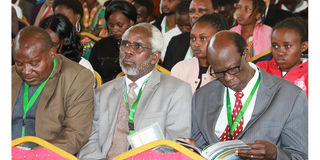Towards putting Africa on a more resilient, sustainable, and prosperous path
Sponsored by Karatina University

A section of participants at the International Conference on Climate Change and Sustainable Development hosted by Karatina University in Nyeri County on May 24-26, 2023.
By James Murimi and Mercy Mwende
At a three-day International Conference on Climate Change and Sustainable Development hosted by Karatina University in Nyeri County on May 24-26, 2023, Unep Kenya’s programme director, Dr Cyrille-Lazare Siewe, spoke passionately about the need for African nations to strengthen their commitments towards mitigating the effects of climate change.
In particular, he called on researchers in the continent to keep coming up with new climate change mitigation strategies, saying: “Our planet is facing an unprecedented crisis, and the urgency of the situation cannot be overstated. An Africa free of climate change is a dream that is within our reach, but it will require sustained efforts and commitments from all of us.”
Dr Siewe asked African states to invest generously in areas such as renewable energy, conservation agriculture and agroforestry, and protection of forests and biodiversity. He also called for investments in climate resilient infrastructure and climate justice advocacy, as well as special programmes to empower women and youths. By doing so, he said, the continent will be on the path to a more resilient, sustainable, and prosperous future.
The international conference brought together academicians, researchers, environmentalists, climate change experts, and industry players, as well as special groups that are disproportionately affected by climate change, including women and youths. Participants came from East Africa, United States, Canada, and the United Kingdom, among other nations, and were rallied to discuss the theme: “Mitigating the Impact of Climate Change and Biodiversity Loss on Sustainable Development: A Call for Action”.
“Advocating for climate justice, including fair access to climate finance and technology, is essential to ensuring that Africa is not left behind in the fight against climate change,” Dr Siewe said.
Chairman of the Council of Karatina University, Prof Francis Gichaga, echoed the same urgency, noting that climate change had caused human suffering across the globe, as well as nationally, and needed urgent intervention.
“We have all experienced the devastating effects of climate change directly or indirectly. I grew up in Nyeri, and I can testify to the changes in weather patterns that I have witnessed over the years,” he said.
“The snow cover on Mount Kenya has reduced. Rivers that used to flow powerfully with distinct sounds have become small streams. The sounds of insects and the diverse birds that used to greet us in the morning have disappeared,” he added.
Karatina University Vice-Chancellor, Prof Mucai Muchiri, urged researchers to tap knowledge and skills from institutions of higher learning so as to boost the fight against climate change. “It is imperative that researchers align their activities to those that aim to mitigate the impacts of climate change,” he said.
Other academicians attending the conference spoke about a widespread lack of relevant agro-ecological policies and strategies to mitigate climate change. Other countries, some said, had either not updated relevant regulations, or encountered challenges with their implementation.
For instance, Mr Padde Daniel, a researcher from Uganda, cited lack of laws and policies for protecting urban forests. “There is a need for state and non-state actors to work together so as to promote, conserve and protect the forests within towns, cities or the suburbs, by drafting urban forest policies,” he said.
Among the issues agreed on at the conference include the need to fund community organisations so that marginalised populations and those living in arid and semi-arid countries can be empowered with climate mitigation and adaptation initiatives, including holding eye-opening forums.
“During such forums, the climate agenda should be delivered in a language that is easy for the common people to understand, so that the climate change discourse is well received at the grassroots level,” read part of the conference resolutions.
Participants resolved to have youngsters placed as environmental conservation ambassadors by introducing such studies in school curricular.
“Universities should also bridge the gap of knowledge by conducting training and aiding in impactful climate research,” the conference further resolved.
During the three-day discourse, participants learnt about the effects, adaptation and mitigation of climate change on food security and climate-smart practices in agriculture, which is the backbone of most African countries.
Meanwhile, Nairobi will host the African Climate Action Summit, which is scheduled for September 4-6 this year. President William Ruto is the Chairperson of the Environment Committee at the African Union (AU), and will be hosting delegates from across the globe.


